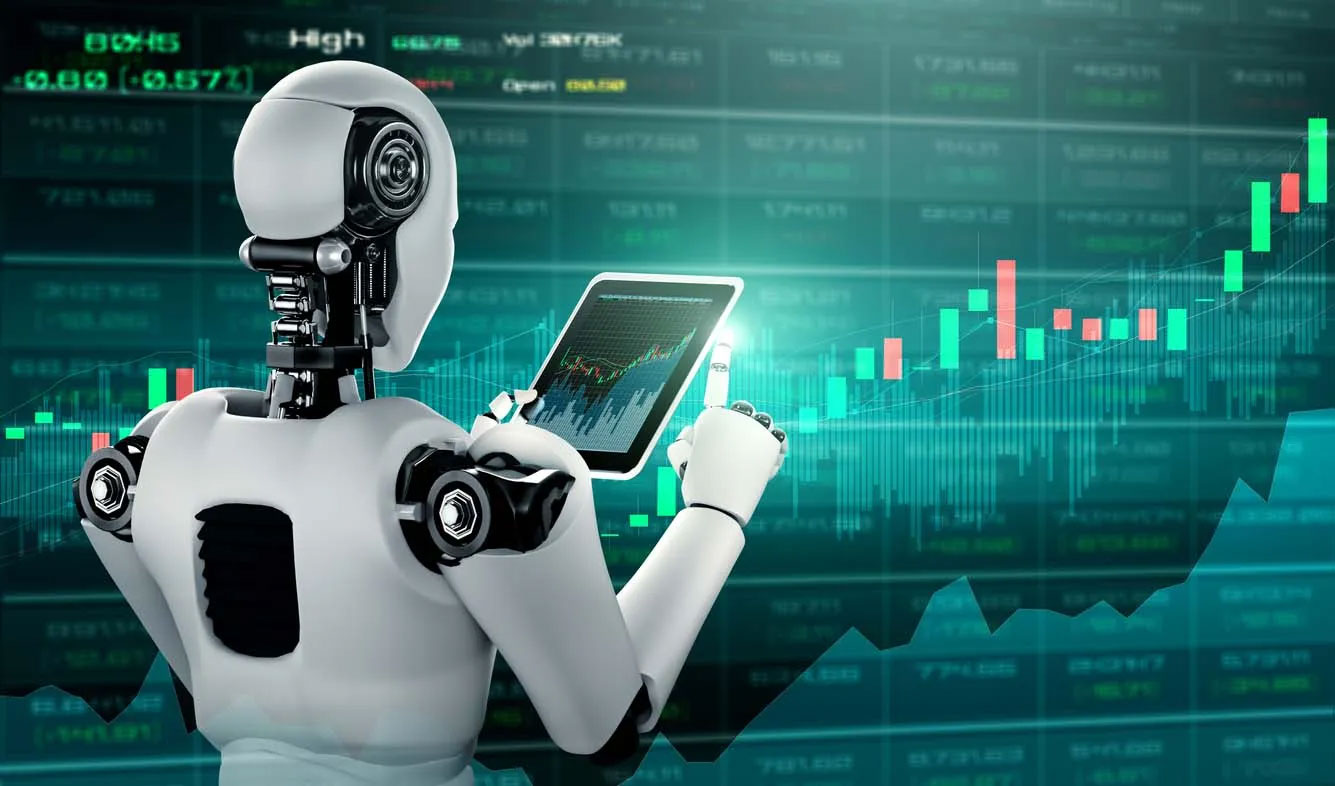Financial markets can be overwhelming. There are thousands of markets, constant information, and news.
This pressure can lead to rushed trading decisions, which often result in losses. It's better to follow clear rules and only trade when you have the right setups.
Given the challenges traders face, it’s no wonder that the promise of Artificial Intelligence (AI) trading is cropping up everywhere.

Imagine a tireless robot sidekick. It sifts through mountains of data for you. And executes trades with pinpoint accuracy. No work for you, but BIG profits!
Sounds attractive, right? Well, tread carefully.
Where there’s exciting tech and big promises, there are also those ready to take your money.
Because whenever there’s a hot new technology that promises the earth, you can bet your bottom dollar there will be unscrupulous operators not far away…
They’ll come along, with their emails, social media posts and adverts, full of big promises, ready to separate the unsuspecting from their cash!
The Commodity Futures Trading Commission (CFTC) (US regulator for derivatives) is clearly worried about it.
It recently issued an advisory warning to investors, saying: “When it comes to AI, this advisory is telling investors, ‘Be wary of the hype.’ Unfortunately, AI has become another avenue for bad actors to defraud unsuspecting investors.”
Exactly.
And it puts all investors and traders at risk.
There is no doubt that AI offers exciting possibilities in all walks of life. And trading is no exception. But it’s not infallible. And there are lots of dangers.
In this guide, we want to make you aware of some of the risks we know about. And give you some steps to take to protect yourself.
The Rise of the Machines
Let’s start with a definition of what AI is.
IBM describes it as this:
“Artificial intelligence, or AI, is technology that enables computers and machines to simulate human intelligence and problem-solving capabilities.”
What does that mean for trading? It means tech that enables computers – or robots – to trade like us.
And, of course, the dream would be for it to be trading successfully and profitably for us. Which is what all the marketers want you to believe.
AI trading bots crunch lots of market data to identify trends, predict future price movements, spot high-probability trades and even place them for you. That’s the promise anyway.
However, the potential benefits come with a dose of caution. Some experts worry that widespread adoption of AI trading could lead to increased market volatility.
Imagine a scenario where numerous AI bots, all programmed with similar strategies, identify the same trading opportunity at the same time. It could lead to rapid price swings and potentially trigger ‘flash crashes’.

How to identify scam broker
AI trading is exciting, but the financial industry is rife with scammers. Scam brokers entice investors with promises of big returns and low fees. Once you invest, things go bad quickly. Here are some red flags:
-
Guaranteed Riches: No legitimate platform guarantees consistent, risk-free returns.
-
Unrealistic Performance Claims: Be sceptical of astronomical returns claimed by AI technology.
-
High-Pressure Sales Tactics: Beware of aggressive pitches pressuring you to invest quickly.
-
Hidden Fees and Unclear Terms: Legitimate platforms will be upfront about all costs.
-
Shady Backgrounds: Research the company’s history, leadership, and regulatory status.
Victims of these scams can experience financial losses, account takeovers, and even identity theft.
Finding a Safe AI Trading Partner
How do you find a reliable AI trading platform? Here’s your checklist:
-
Regulation is Your Friend: Look for platforms regulated by bodies like the FCA (UK) or SEC (US).
-
Do Your Homework: Investigate the company’s background and credibility. Check government websites like Companies House in the UK for registration information, company history, details of directors and key personnel and financial statements (for larger firms).
-
Fort Knox Security: Look for platforms with strong security measures.
-
Help When You Need It: Responsive customer support is key.
-
Transparency is King: Be wary of hidden fees or vague explanations.
Does AI Trading Really Work?
There is no reason why AI can’t work in finding trades. And as AI improves, perhaps AI trading will become more reliable. But success depends heavily on the algorithm’s design, market conditions, external factors (war, economic shocks, etc.) and your risk tolerance.
What is the Best AI for Trading?
It’s like asking ‘how long is a piece of string?’ There’s no single “best” when it comes to AI trading and you’d have to do some rigorous testing and back testing. Perhaps the right AI for you depends on your trading goals, preferred markets, and your tolerance to risk and level of capital you can afford to lose.
Don’t Be Fooled by the Hype
And here’s something else to consider. Not all that glitters is gold, especially when it comes to AI trading. Some companies might be overhyping their “AI” features. They might use fancy terms to sound impressive and to tap into the AI hype. But are their algorithms as smart as they claim?
Think about it this way: if AI trading was the ultimate game-changer, wouldn’t all the big hedge funds be using it? But the reality is, many haven’t jumped on the bandwagon yet. This should make you think twice about any claims of guaranteed riches.
If in Doubt, Stay Away
So, there you have it. Hopefully this guide has given you something to think about when you’re bombarded with ads and emails promising you endless riches from AI trading. Just tread carefully.
To find out more about Trendsignal and our award-winning trading education courses and strategies, book your free place in our next available webinar.






